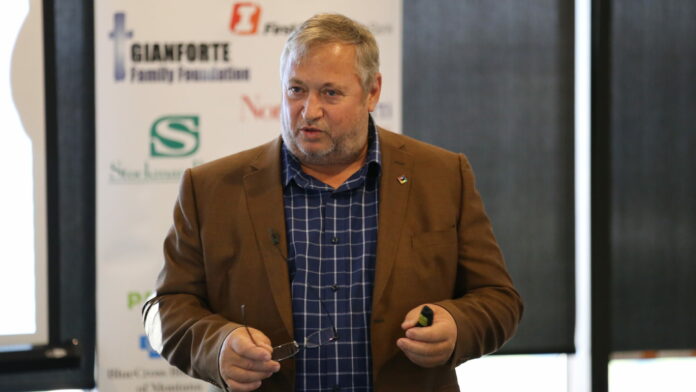
NEAL Froneman, CEO of Sibanye-Stillwater, said he did not feel any pressure to do a deal in the gold sector despite a forecast fall in the firm’s production over the next decade.
“We are not fazed about a decline in production profile because it’s not the only asset we have, and it’s one of the reasons we moved into PGMs (platinum group metals),” said Froneman in an interview.
“We have a much more sustainable company and the market knows that our mines have 10 years of life and if we don’t replace them, we will replace them with lithium mines or other PGM mines or a copper mine, or whatever,” he said.
According to a report by RMB Morgan Stanley earlier this year, Sibanye-Stillwater would be able to maintain current production of between 800,000 to one million oz a year until about 2025 and then output would tail off.
Froneman said now was “not the right time” to consider corporate action in the gold industry as he expected price weakness in the metal. However, he was concerned about keeping the company’s 30,000 employees in a job.
The company recently agreed a new three-year wage deal with unions including the Association of Mineworkers & Construction Union and the National Union of Mineworkers following a three-month strike over pay. The agreement was for an average 6.3% lift in wages over the period and a one-off, ex-gratia payment.
“We’re not the Red Cross, but right now those operations do fund themselves,” said Froneman of the mines – Kloof and Driefontein in Carletonville, west of Johannesburg and the Beatrix mine in the Free State province.
He added, however: “They are marginal, which is why we stuck to our guns with the wage demands. But no, we like gold, it’s counter-cyclical to the industrial metals that we have and at the right time we will probably expand our gold portfolio.
“But not now.”
Gold Fields, AngloGold inquiries
Froneman last year was speculated to have made inquiries regarding gold mergers with AngloGold Ashanti and Gold Fields, neither of which panned out. He was subsequently quoted as saying it would make sense to build a South African mining champion.
On May 31, Gold Fields unveiled an all-share takeover proposal for Yamana Gold, a Toronto-listed business with operations in North and South America. Analysts panned Gold Fields for an offer deemed expensive, but its CEO, Chris Griffith is likely to tell investors next week he’s sticking to his guns on the offer.
Froneman said he didn’t want to comment on the Gold Fields deal, but said his company found it hazardous to use South African shares for deals.
“Unless you’re using shares in a rights issue or something where all shareholders can benefit and nobody’s disadvantaged, it’s incredibly difficult for South African companies to use their currency,” he said.
“You’ve seen us use debt, and debt also can be risky as well if you have a sequence of events, and your debt paying ability gets impacted.
“It’s part of the challenge of doing mergers and acquisitions as a South African company now, which is why we’re not overly focused on our share price because it doesn’t really feature as currency for our transactions,” he said.










